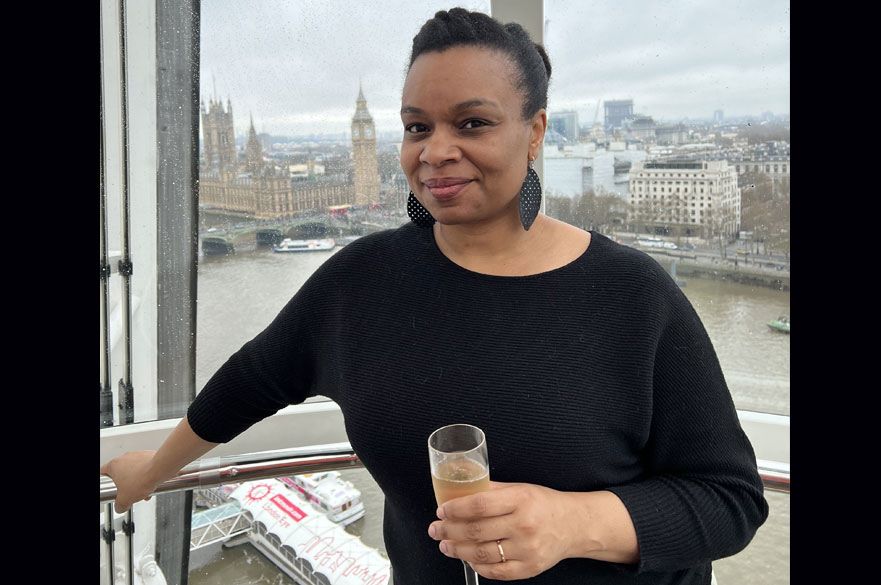5 minutes for Black History Month with...Chinyere Williams
Chinyere Williams, Lecturer in Forensic Toxicology, is a member of NTU’s University Shadow Executive Team (USET). To mark Black History Month (BHM), we spent 5 minutes with Chinyere to find out more about her thoughts on this year’s BHM theme and who has inspired her the most in her life.
By Ryan Weston | Published on 3 October 2023

I joined NTU as a lecturer in March 2020, just before the pandemic lockdown. Prior to this, I lived and worked in the Bay Area, in Northern California. I had been a forensic toxicologist for nearly 15 years and in 2019 I moved to Nottingham with the goal of learning about forensic practice in other countries.
When you were growing up, what did you want to be?
My career target throughout childhood was to establish how a person died. My parents weren’t thrilled when I gave this answer to curious adults, but that’s all I ever wanted – to be a forensic scientist.
What are your thoughts on this year’s theme for Black History Month and the role Black women have played in shaping change in various sectors?
I can’t speak for everyone, but I feel that Black women have had a lot of focus in the media in recent years. This is both terrifying and endearing at the same time.
On the terrifying side, Black women (including trans women) have been vocal about radical change and intersectional feminism. Being the focus of social discussions can make you feel as though every word you say in professional circles has significant weight and consequences. I think this makes some non-Black colleagues a bit nervous in casual workplace conversations. In San Francisco I was told that it was less intimidating if I remained seated when asking questions to management because standing made them feel ‘uncomfortable’.
On the positive side, I think it shows how far Black women have come in the workplace. I’m thrilled to see other Black women in spaces that have historically been culturally restrictive or less diverse. There are some incredibly brilliant women getting the positive recognition they deserve, and this was not always the case.
Can you name a black female who has inspired you in your life? What inspired you most about this person?
There are two women that immediately come to mind who have truly inspired me. The first is my mother, Gloria. She is fiercely independent and was one of the first people to work on personal computers in Anchorage, Alaska. She is very much responsible for my work ethic and drive.
The second is a former teacher, Karen Edmonds. I saw and learned from the way she responded to prejudice and adversity in school. I reached out to her, and we spoke nearly every day after that – she was an incredible mentor. Having her around my school was like having another mother to look after me.
Both Karen and my mother worked in areas that were not diverse, but they were both highly respected by their colleagues. They both worked hard but had happy and fulfilling social lives outside the office. I’ve also found them to be graceful, funny, and classy despite having a tough external demeanour. They may not be published or known around the world, but the impact on me has been significant.
I’m thrilled to see other Black women in spaces that have historically been culturally restrictive or less diverse. There are some incredibly brilliant women getting the positive recognition they deserve, and this was not always the case.
Have you navigated any barriers or challenges through your academic studies or career?
Where do I begin…? Absolutely, I’ve encountered challenges in my career and academic studies. In the past I was told that my ‘people’ are not good at maths and science. I’ve been told that I should study English instead of chemistry because Black people are not known for their strength in the sciences (this was back in 2003). I’ve had senior management discourage my promotion because they felt uncomfortable having a Black person in a leadership position.
How did you overcome these challenges?
I’m not sure how to answer this because I’m not sure how much I’ve overcome these events. My grandmother had a saying, “process and move on”. I think I do just that – process and keep it moving. I also make a point to counsel or help any others who are facing similar scenarios.
What is your proudest achievement?
My proudest achievement is speaking out against unethical and poor practices at a former agency. It’s not easy speaking up against a systemic flaw, and it nearly broke me, but I believe in ethics, especially in forensic science. “Dare to stand before those you fear and speak your mind, even if your voice shakes.” – Maggie Kuhn.
What is one piece of advice you have received that you feel has helped you?
It’s difficult to say one piece of advice has helped me. Having good, honest, loving people around you will ensure you have the most helpful and supportive advice through the years. If there’s anything I can pass along, it’s to be mindful of the company you keep – they can pick you up when you don’t know you’re down.
Current favourite song, film, book and podcast?
Song on loop: Back on 74 by jungle4eva
Book: Children of Blood and Bone by Tomi Adeyemi
Podcast: No Such Thing As a Fish.
Keep up to date with all of our activities to celebrate Black History Month 2023 on our campaign page.